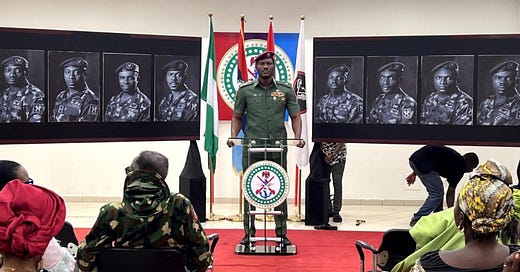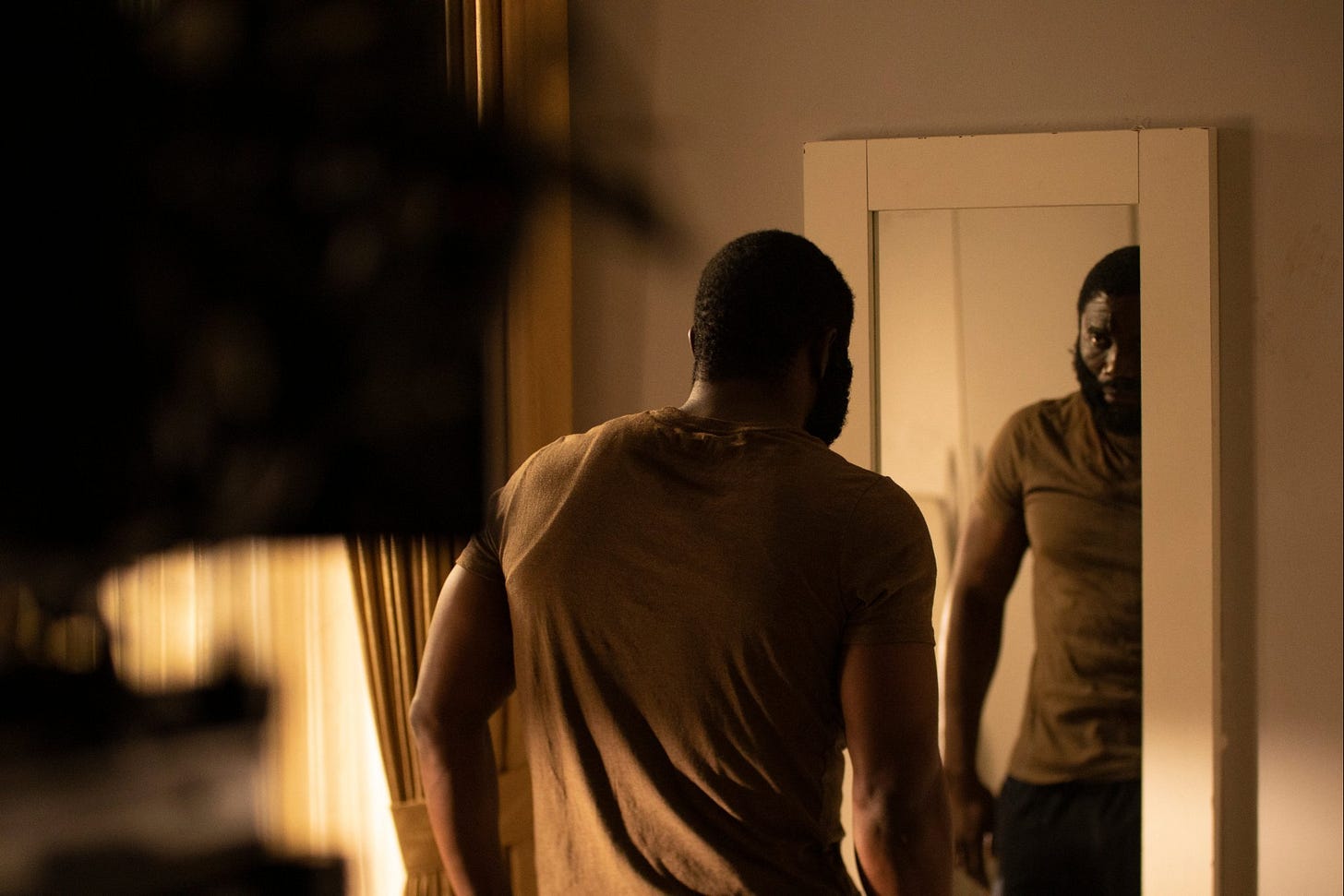"At Ease" Reminds Us That The Battle Doesn't End When a Soldier Comes Home
Seun Richards' film delivers a raw examination of trauma and healing through the eyes of a soldier.
AT EASE is a movie by Seun Richards currently streaming on Prime Video. This review contains minor spoilers. Like. Share. Subscribe.
At Ease opens with a powerful hook:
A battalion of soldiers deep in the forests of Northeastern Nigeria, led by Major Ifeanyi Agbo (Samuel Asa’ah), is on a mission to rescue captive women from insurgents. Major Agbo is established early on as a leader who deeply cares for his team, and the tension rises as everything seems to be going according to plan—until a surprise time bomb detonates, shattering their victory and leaving everything in chaos.
This explosive opening scene is not just the most action-packed moment of the film, but it also introduces us to the man Agbo once was, making it possible to root for him as he tries to work his way back to that former self.
But the film is about much more than action. At Ease dives into the weighty subjects of PTSD and survivor's remorse—two themes that don’t receive enough attention in Nigerian cinema or, frankly, in life. Agbo’s internal battles are just as dangerous as the ones he fought on the battlefield, and this psychological toll is depicted with a level of storytelling grace that inspires viewers to confront the emotional aftermath of traumatic activities.
One of the most heart-wrenching scenes comes early when Major Agbo desperately tries to convince his boss (Keppy Ekpenyong Bassey) over the phone that he is fit to return to work, despite still being mentally shattered. This is obvious to everyone around him, but Agbo doesn’t know how to be anything else: once a soldier, always a soldier. The agony he feels is palpable, and the weight of his sufferings weighs heavily on him. The breaking point comes when he’s told he will be forced into early retirement on medical grounds—a blow that shakes his very sense of purpose and identity.
This pivotal moment sets the stage for Agbo's downward spiral. He attempts to maintain a brave front, trying to convince his wife, Lara (Anee Icha), and everyone around him that he's fine. Yet, the cracks in his facade only grow wider. It is a delicate dance between wanting to recover and accepting that recovery is not as simple as putting on a brave face. As viewers, we see the internal struggle that makes him question his worth, especially after the accident that left him physically and mentally scarred.
The tension between Agbo and his wife is the emotional core of the film. Lara is caught in a complex web of love, duty, and self-preservation. Her mother warns her about the dangers of living with a man who refuses treatment, and this mother-daughter conversation plants a seed of doubt that eventually blossoms into full-blown fear. In one particularly intense scene, Agbo, lost in a violent flashback, nearly strangles his son, mistaking him for an insurgent. It’s a jarring moment that underscores how much Agbo’s mind has been fractured, and it leaves us wondering how long it will take for his unaddressed trauma to destroy not only himself but also those he loves.
Director Seun Richards uses these emotional beats to create a narrative that tries not to shy away from the harsh realities of PTSD. However, the film’s pacing suffers from its nearly two-hour runtime, which feels unnecessarily stretched given the straightforward nature of its storyline. The film repeatedly circles the same emotional points—Agbo’s refusal to accept help, his family’s increasing fear, and the slow erosion of his mental state. A tighter, more concise runtime, or a deeper exploration of the psychological and emotional depths of its characters, would have made the impact of these scenes much stronger without feeling like it was dragging the audience through repetitive emotional territory.
Yet, even with its pacing issues, simply by existing, At Ease excels in painting a picture of survivor’s guilt.
The grief that Agbo carries is almost unbearable, and Samuel Asa'ah does a good job portraying a man who feels as though he’s failed those who didn’t make it out alive. Even without so much insight into the inklings of his character, Asa’ah’s performance grounds the film, making us feel the weight of Agbo’s trauma and the hopelessness of his situation. On the other hand, Anee Icha’s portrayal of Lara is competent, but there are moments where it feels like she wasn’t the best fit for the role. The emotional depth required for Lara’s journey doesn’t always come through, and it slightly diminishes the power of some of the scenes she shares with Samuel.
However, one of the film’s more daring choices is its exploration of guilt through Lara’s character, highlighting the emotional burden carried by those closest to the survivor. Lara’s prayer by her husband’s hospital bed early on in the movie, asking God to bring him back, is revisited later in the run time, in a moment of intense frustration when she bitterly declares, “It would have been better if you never came back.” It’s a gut punch, not just for Agbo but for the audience as well. Her words convey a painful truth that often goes unspoken—the long-awaited return of a loved one is not always a joyous reunion. For some, the emotional and psychological toll is so overwhelming that death would have seemed like the kinder alternative. This moment is a stark reminder that the trauma doesn’t end with the soldier (read as survivor); it permeates the entire family.
At Ease does, however, pull back from this dark emotional cliff and gives us a more hopeful conclusion. Agbo eventually seeks the help he has long resisted, and the film closes with a sense of resolution as he begins to heal both physically and emotionally. While this neat ending may feel a bit too convenient given the heavy themes, it provides a sense of closure that might have been too brutal to deny the mainstream audience after what many would consider an intense emotional journey.
Overall, At Ease is a good film that tackles difficult themes not often seen in Nollywood. While it may have its flaws in pacing and story depth, its exploration of PTSD and survivor’s guilt is both timely and necessary. It reminds us of the invisible scars our soldiers carry—and the toll those scars take on everyone around them.
Directed by: Seun Richards
Written by: Stephanie Dadet
Starring: Samuel Asa’ah, Anee Icha, Keppy Ekpeyong Bassey,





